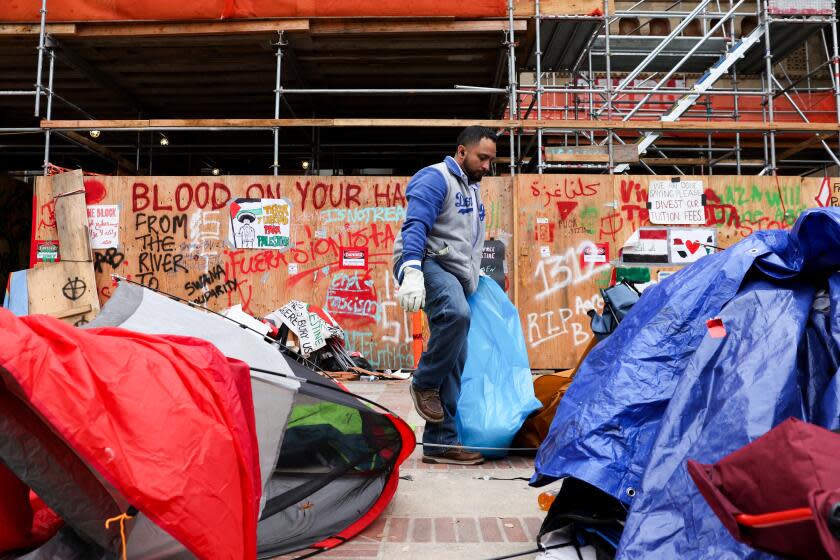With remains of UCLA camp tossed in dumpster, Gaza activists assess the future

With the help of bulldozers, items including tents, chairs and yoga mats were removed Thursday morning from the UCLA encampment occupied by pro-Palestinian protesters and shoved into a large gray dumpster.
Packages of unopened plastic water bottles lay on the grass. Nearby, two white trucks held pieces of wood that had been used by protesters to barricade the camp. A group of four UCLA graduate students walked over to Dickson Court, the area on campus where the encampment once stood, only to learn the camp had been taken down. The action followed the arrests early Thursday of more than 200 protesters by officers in body armor, helmets and face shields.
The grad students came bearing donations; they had brought water, chips, masks and protective eyewear to the protesters throughout the week. They decided they would give the items to one of the other Southern California universities with encampments.
Such camps have spread to college campuses across the nation in a student movement unlike any other this century. Protesters are calling on universities to stop doing business with Israel or companies they say support the war in Gaza. On Tuesday, police arrested at least 25 protesters at Cal Poly Humboldt, where antiwar demonstrators had taken over buildings, spurring school officials to close the campus.
But with the UCLA camp now razed, some protesters told The Times on Thursday they feared the pro-Palestinian protest's momentum in Westwood might have stalled.
Read more: Gazans thank U.S. campus protesters. Israel condemns what it sees as 'Nazi-like behavior'
“There’s a lot of anger and frustration and desire to keep protesting, but we’re really still figuring out what that would look like,” said a 19-year-old UCLA freshman who declined to give her name.
Outside Dickson Court, pro-Israeli students also gathered, watching the cleanup process.
A 20-year-old UCLA undergrad, who requested anonymity because he said he feared being attacked, participated in a counterprotest on Sunday. A crowd of people from the Jewish community gathered in front of the camp and sang the Israeli national anthem, brought out a DJ and held a dance party, he said.
The undergrad, who said he is Jewish, was disheartened by the encampment, he said. But he stressed that he didn’t participate in any of the other counterdemonstrations and condemned the violence that began Tuesday night just before midnight.
Over several hours, counterdemonstrators hurled objects — including wood and a metal barrier — at those inside. Fireworks were launched into the camp, and some counterprotesters tried to force their way in. Fights broke out, and the pro-Palestinian side used pepper spray to defend themselves.
“It was deplorable,” the undergrad said of the attack on the encampment. Violent counterprotesters “need to be punished under the maximum extent of the law. They do not represent our movement, and as such they must be punished for not acting in accordance with the law and the values they purport to uphold.”
Read more: UCLA struggles to recover after 200 arrested, pro-Palestinian camp torn down
He said he’d lost a lot of friends since the Israel-Hamas war broke out because of their different perspectives.
“It’s unfortunate because, for me, this is quite personal because I am from the Middle East," he said. "I have family in Israel, I have family in Iran, and seeing the chaos break out in the region where my ancestry is from, it’s cutting to see individuals who have no connection to the ongoing violence say that I don’t know what I’m talking about or they can’t be friends with me because of their political stance.”
Meanwhile, as Gaza activists who took part in the UCLA camp assessed the future, many seemed eager to return. What awaited them, however, was unclear. A current and former student from Occidental College said they’d heeded “a call for bodies” at UCLA put out Wednesday night but figured they wouldn’t be called again with the encampment gone.
Some staff seemed more optimistic the protests would quickly be revived.
“I might go back on Friday,” said a staff member who was arrested Thursday, though she noted her plans might be dampened by sleep deprivation. When she was arrested, she said she was standing with 10 to 15 faculty or staff who were booked along with her.
Like many on Thursday, the staff member declined to give her name due to fear of retaliation from the university, saying she worked in a part of the school where some colleagues seemed wary of the protests.
Some students said they were unclear whether they would face academic repercussions from protesting — although they said they'd seen some unambiguous emails from the university saying there could be “disciplinary action including suspension or expulsion.”
Despite the uncertainty and fear, one of the graduate students who brought donations Thursday morning did not express regret.
“I think it’s really important to stand up for what you believe in,” said the student, who requested anonymity because of fear of reprisals. "I’ve been here a few times to give donations ... and every single time, people have met me with grace and a lot of respect."
This story originally appeared in Los Angeles Times.


